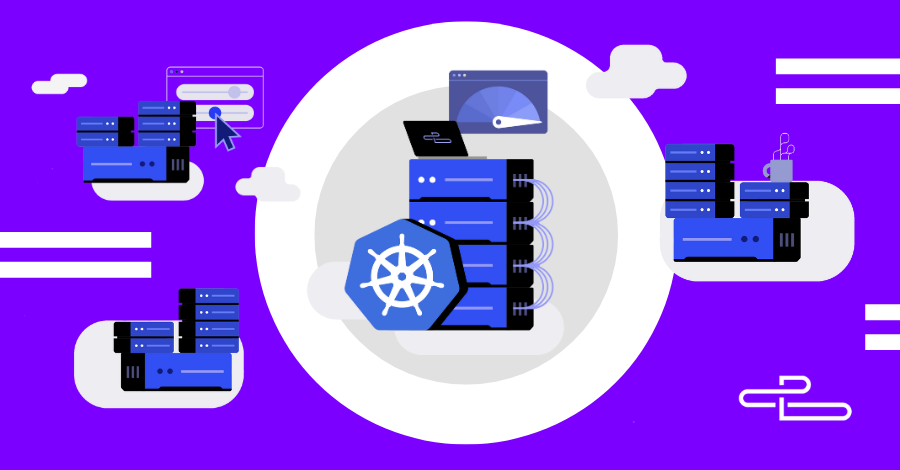The use of Kubernetes is growing year after year, and the system is now the go-to tool for container orchestration.
We’re proud to launch UpCloud Managed Kubernetes, to help businesses enjoy all the benefits of using Kubernetes without any of the headaches of maintaining it.
Every year, more and more businesses are adopting Kubernetes – and for good reason.
Around the world, companies are taking advantage of the standardised systems that Kubernetes affords: Being able to deploy apps effortlessly across multiple hosts – no matter who their service provider is.
Kubernetes allows businesses to scale their workloads seamlessly in order to maximise reliability and minimise downtime, all while keeping costs from spiralling.
But despite all of its benefits, getting the most out of Kubernetes can require a dedicated admin team to set up and manage, adding time and resource burdens that detract from the ease of use that Kubernetes brings.
That’s why we’ve launched the brand new UpCloud Managed Kubernetes service.
With a managed service, customers can enjoy all the benefits of using Kubernetes without burning through their resources to maintain it. Simply set up the Kubernetes environment that best suits your needs, and easily control your containerised applications in a fast, secure, and flexible environment – without worrying about maintenance or downtime.
Managed Kubernetes launches with support for Kubernetes version 1.26.3. It’s initially available in Helsinki and Frankfurt with more zones to follow.
Introducing Managed Kubernetes
UpCloud Managed Kubernetes (UKS) allows users to deploy containerised applications without having to install and maintain the needed cloud infrastructure.
Our Kubernetes-as-a-Service (KaaS) offering allows your DevOps teams to run applications seamlessly in containers, allowing them to focus their efforts on other tasks which improve the customer experience.
But what sets UpCloud’s Managed Kubernetes apart is that it also gives them full control of their data usage, keeping costs under wraps.
This is because Kubernetes consists of two layers: the control plane and the data plane. The control plane acts as the ‘brain’ of the operation, while the data plane does the legwork.
Managing the control layer is often seen as the hard part of Kubernetes systems. Managed Kubernetes takes care of that completely.
Meanwhile, the data plane consists of clusters of ‘worker nodes’ which are governed by the control plane. The worker nodes utilise UpCloud’s trusted Cloud Servers backed by our N+1 redundant infrastructure which ensures you don’t have to worry about downtime.
But we understand that businesses want the flexibility to ensure they have all the data they need without paying for the data they don’t use. And that’s why with Managed Kubernetes we offer fully-managed high performance that takes care of the complexities of the control plane, while still allowing you to fine-tune the data plane.
For DevOps-oriented teams who want to run on Kubernetes without the added admin overhead of self-maintained Kubernetes clusters, we believe this is the perfect solution.
Developer-driven and solutions-focused
No matter whether you’re a small business or a global enterprise, Kubernetes simply grows up or down with your changing demands and delivers applications consistently and easily – no matter how complex your needs are.
Take your applications from deployment to production in record time
Experience the fastest cloud on the market and get up and running in just 10 minutes from set-up to operational use – no matter your size.
Optimise your costs without sacrificing quality
Optimise your data usage to ensure you don’t pay more than you need to, while still maintaining effortless peak performance.
Ensure maximum uptime with self-healing
Managed Kubernetes is resilient by design. It offers built-in self-healing features, allowing users to easily recover from almost any failure without manual intervention – ensuring as little downtime as possible.
Relentless Improvement
We’re proud to launch Managed Kubernetes as a service to our cloud computing community… But we won’t stop there.
We continuously work to improve all of our products, and our team is already developing upgrades and new features to Managed Kubernetes. Expect to see the following upcoming updates post-launch:
- Expanding availability: Deploy your Kubernetes clusters in Singapore, London, and Chicago with further availability coming later.
- Lifecycle management: Users will be able to schedule cluster upgrades between different versions of Kubernetes and operating system hotfixes.
- Private node groups: With private node groups, users will have the ability to run node groups away from public IP addresses, using NAT Gateway services for external connectivity and ultimate security.
- Private Cloud support: Users will soon be able to ensure gold-standard security with the option to run worker node groups on a Private Cloud.
- Autoscaling: Be as efficient as possible with upcoming support for Kubernetes cluster-autoscaler which automatically adjusts the size of the Managed Kubernetes cluster to ensure resource usage is just right.
Start your journey into Managed Kubernetes today by following our tutorial or jump straight in by heading to the Kubernetes section in your UpCloud Control Panel.

